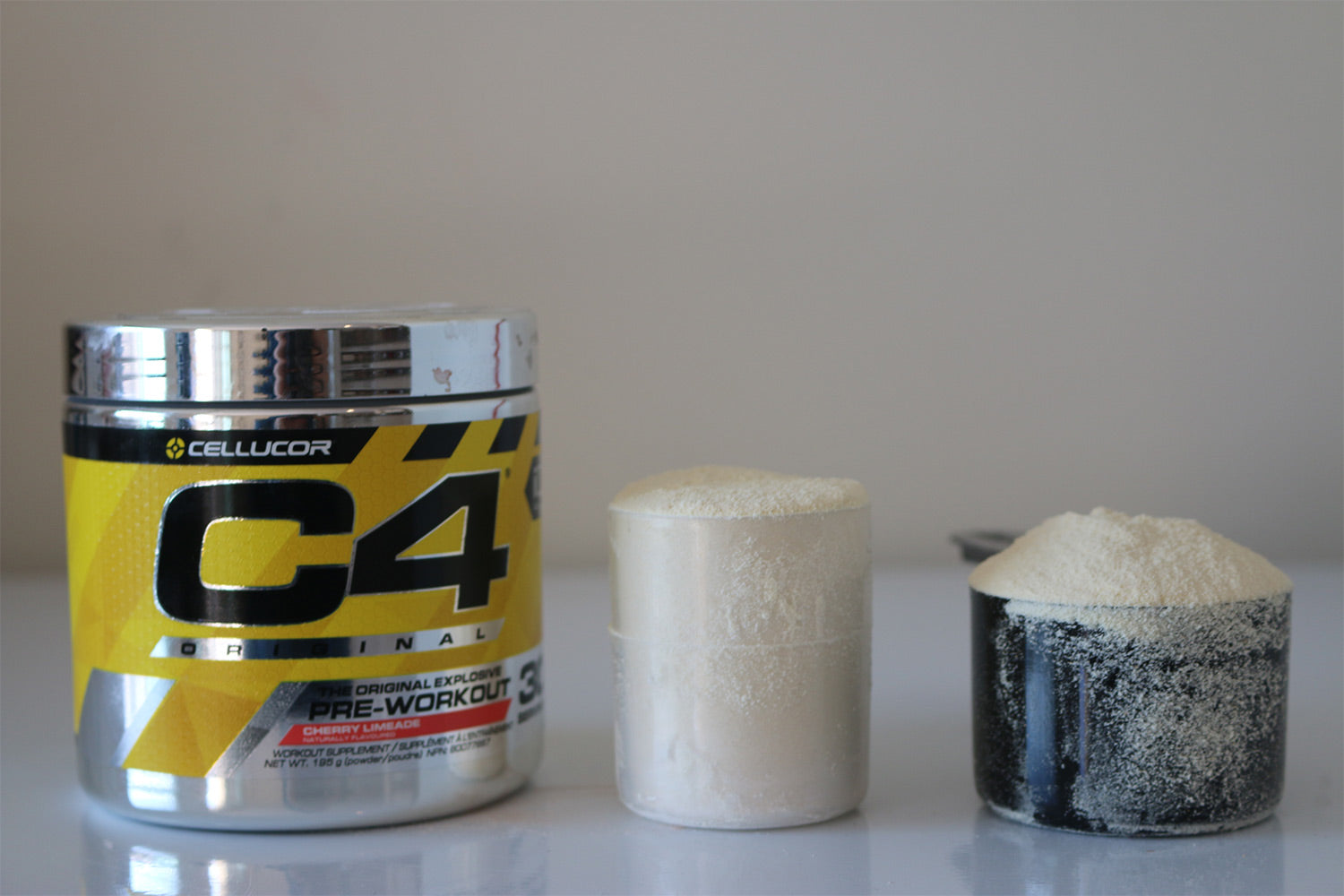Whether you’re a veteran of the gym or fitness novice, you’ve probably heard of pre-workout supplements. Many fitness enthusiasts sing the praises of these powders and pills that boost your energy before exercising. How do pre-workout products provide such energy? The answer: Caffeine.
Even if you don’t use a pre-workout supplement, there’s a good chance you consume caffeine regularly. In fact, 90 percent of adults in the United States consume caffeine daily. In addition to providing a boost of energy, caffeine can improve your mental functioning and reaction times. This makes it a very beneficial compound for adults of all kinds.
Pre-workout supplements are beneficial for many of the same reasons and provide many fitness-specific effects that may help you in the gym. That being said, there are some drawbacks to be aware of.
If you’re considering adding a pre-workout supplement to your fitness regimen, continue reading our guide to find out if it’s right for you!
What’s In a Pre-Workout Supplement?
The ingredients that comprise pre-workout supplements vary between brands; however, the primary ingredient is almost always caffeine. An average pre-workout supplement will include anywhere from 150 to 300 milligrams of caffeine, equating to roughly one to three cups of coffee.
Other ingredients commonly found in pre-workout include:
- Beta-alanine is a non-essential amino acid that increases carnosine levels in your muscles, thus controlling lactic acid buildup.
- Creatine is a popular and well-researched supplement that can increase athletic performance and boost muscle growth.
- L-Citrulline helps maintain blood vessel function and can increase ‘pumps.’
- BCAAs help reduce the amount of protein breakdown that occurs during workouts and contributes to muscle recovery and growth.
The Dangers of Too Much Caffeine
Like most things in life, caffeine is best in moderation. Research has shown that 400 milligrams of caffeine per day appear to be the upper limit for adults. Consumption beyond that can result in such side effects as:
- Headache
- Insomnia
- Nervousness
- Irritability
- Frequent urination or inability to control urination
- Fast heartbeat
- Muscle tremors
In some cases, excessive caffeine consumption can lead to sudden cardiac events in otherwise healthy adults. Therefore, it is best to monitor your caffeine consumption.
If you consume more than one cup of coffee per day, stick to a pre-workout supplement with a lower dose of caffeine, such as 150 milligrams. While a 300-milligram pre-workout may appear to be under the limit, you must account for other sources of caffeine you consume throughout the day––coffee, tea, soda, energy shots, etc.
On top of that, a 300-milligram pre-workout supplement may be too much at once, especially for someone without much of a tolerance. While four cups of coffee are sipped on throughout an entire day, a 300-milligram pre-workout supplement is consumed rapidly. Even though it’s under the limit, this rapid consumption can lead to dangerous side effects.
Side Effects of Other Ingredients
The other ingredients found in pre-workout also come with some side effects to be aware of. While creatine is safe and effective, it can also lead to bloating, weight gain, and digestive issues.
As citrulline increases blood flow, it can also lead to headaches and migraines. On top of that, ingredients such as beta-alanine, niacin, and magnesium can lead to such uncomfortable effects as skin-flushing, tingling, and diarrhea.
You can curb such effects by ensuring proper dosages, mixing the pre-workout with plenty of water, or avoiding supplements that contain ingredients that affect you.
Should I Use a Pre-Workout Supplement?
When used safely and correctly, pre-workout offers many benefits to athletes and gym-goers alike. The primary goal when taking a pre-workout supplement is to enhance your performance potential. Within reason, pre-workout can allow you to train longer, lift heavier, and focus more intensely. Caffeine and creatine mostly contribute to this.
Other ingredients such as citrulline and BCAAs, as well as creatine, provide several benefits to your body before, during, and after workouts. These include promoting proper blood flow, increasing muscle growth, and boosting recovery times.
If you are a serious athlete or trainer who tolerates caffeine and other pre-workout ingredients well, you may derive many benefits from taking a pre-workout supplement. Nonetheless, there are still precautions that you must take to ensure your safety and results.
How To Use Pre-Workout Safely
Whether or not you consume other forms of caffeine throughout the day, start with a pre-workout supplement that contains a lower dosage of caffeine, such as 150 milligrams. This will ensure that you can tolerate the supplement well and slowly increase your dosage as desired.
It is also important to monitor your caffeine usage throughout the day. If you consume two cups of coffee in the morning, you don’t want to exceed 200 milligrams of pre-workout later that day. Furthermore, if you don’t consume caffeine regularly, consuming a large dosage in a short period can lead to greater side effects and potential cardiovascular issues.
Keeping your dosage low is especially important if you consume this supplement before a run or other high-intensity cardiovascular events. Caffeine and exercise separately will increase your heart rate, so caffeine and exercise together can raise your heart rate to a dangerous level. Pre-workout supplements are generally recommended for weight lifting rather than high-intensity interval training (HIIT).
Furthermore, if you have a history of cardiovascular conditions, it is best to stay away from these supplements. As with any supplement you add to your diet, consult with your medical provider to ensure that it’s the right choice for you.
Caffeine Addiction
For the most part, caffeine is well-tolerated and can be a healthy addition to many diets. That being said, without moderation, caffeine can lead to addiction. While caffeine addiction is not necessarily life-threatening, it can interrupt your day-to-day life. For example, as your body becomes dependent on the stimulating effects of your morning coffee, your brain may not become fully alert until the coffee is consumed.
In addition to interrupting your sleep and enhancing fatigue, caffeine addiction can lead to heart problems. On top of that, caffeine is seriously hard to quit, as addiction can include very serious withdrawals. In fact, the World Health Organization recognizes caffeine addiction as a clinical disorder.
To avoid caffeine addiction, avoid large doses and take days off from caffeine consumption. By establishing a routine around coffee, even in moderate amounts, addiction can be induced.
If you are experiencing caffeine addiction, try to gradually lower your dosage throughout several works. Decaf coffee can also help as your brain may associate the taste with the stimulating effects of regular coffee. Additionally, several natural herbs provide an energy boost. Keep reading to find out!
Natural Alternatives
While dietary supplements such as whey protein and multivitamins offer many benefits, it is generally recommended that you derive those nutrients from whole food sources. When your diet doesn’t allow you to hit those macro and micronutrient allotments, it is then recommended that you supplement your diet. Caffeine and other pre-workout ingredients are no exception.
Many pre-workout supplements contain mega-doses of artificial and potentially harmful ingredients. While you can find pre-workouts with good ingredients, you can also find those ingredients in natural food sources.
A cup of coffee, for example, can provide a safe dosage of caffeine while also providing a myriad of other benefits, such as reducing the risk of coronary heart disease, stroke, diabetes, and kidney disease.
While your body produces it naturally, creatine can also be derived from red meat. Many sources of protein, such as eggs, nuts, and meat, contain BCAAs.
There are also many natural, energy-boosting supplements you can take to act as a caffeine alternative:
- Ginseng
- Bacopa Monnieri
- Sage
- Ashwagandha
- Peppermint
- Maca
- Rhodiola Rosea
At the end of the day, your body’s digestive system is designed to derive energy from the natural food sources you consume. When you consume carbs, they are broken down and stored in your liver as glycogen, your body’s primary fuel source. Fats additionally act as an important, long-term energy source for your body. Without proper consumption of carbs and fats, your body will break down muscle tissue.
Many athletes will find benefit in pre-workout supplements as they allow for enhanced athletic performance, thus creating greater potential for results. As long as you pay attention to your body and monitor your caffeine intake, consuming pre-workout is a mostly safe practice. That being said, you can get everything you need from whole food sources.
Pre-Workout: Good or Bad?
Overall, pre-workout can be a good thing for serious athletes or lifters who want to enhance their performance. The boost of energy that pre-workout provides can allow athletes to run faster or lift heavier, allowing greater potential for results.
That being said, most people will adequately benefit from sufficient sleep and a well-balanced diet. Pre-workout supplements can create some dangers, such as mega-doses of caffeine. If you need the boost, though, it can be found from natural sources. While caffeine can be found in coffee and green tea, you can also derive an energy boost from a myriad of natural herbs.
No matter what your fitness goals are, EnergyFit is here to help you reach them. Find out how we can transform your fitness journey today.
Sources:
9 Reasons Why (the Right Amount of) Coffee Is Good for You | Hopkins Medicine
Nutrition and healthy eating | MayoClinic





Leave a comment
All comments are moderated before being published.
This site is protected by hCaptcha and the hCaptcha Privacy Policy and Terms of Service apply.